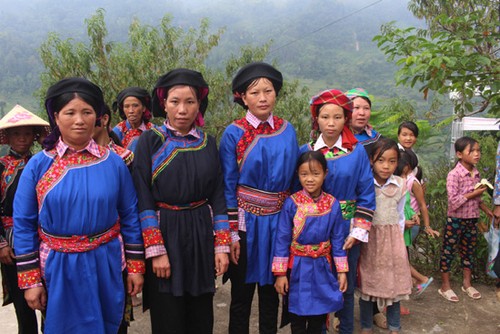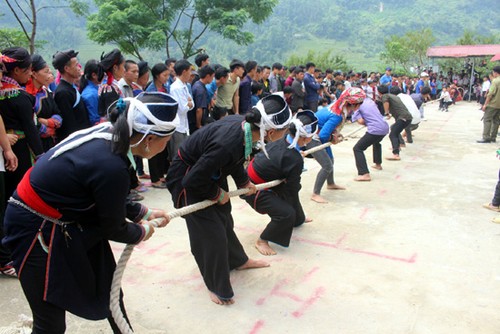 Co Lao women in their traditional clothes. (photo: baohagiang.vn) Co Lao women in their traditional clothes. (photo: baohagiang.vn)
|
The Co Lao have branches called the Green Co Lao, the Red Co Lao, and the White Co Lao. They live in villages of 15 to 20 families in Hoang Su Phi and Dong Van district in Ha Giang province. They have lost their original language and now each branch speaks either Chinese, Nung, Pu Peo, or Mong.
The Co Lao grow rice on terraced fields and maize, buckwheat, green peas, and roots in mountain hollows. Basketry and woodwork are popular crafts. Some villages have blacksmiths to repair farm tools.
Nguyen Huu Son, Vice Chairman of the Vietnam Folklore Culture Association, said: “Life for the Co Lao has improved a lot recently. They speak a local language plus Chinese. In the past they wove fabric and used natural dyes. Now they buy cloth to make clothes, but their costumes have kept their original decorations and designs.”
 Co Lao people play tug-of-war in a festival. Co Lao people play tug-of-war in a festival.
|
A Co Lao village has 15 to 20 households of the same clan. They make earthen-wall houses with Alang grass roofs. The Co Lao living in high mountains have to fetch water from nearby water sources, but those living in flat areas make bamboo aqueducts to carry water to their houses.
The Co Lao worship their ancestors going back 3 or 4 generations. Of their many rituals, their adult naming ceremony and their coming of age ceremony are the two most important in a person’s life. All the villagers attend these ceremonies and congratulate the honoree by singing.
Doing farm work on rocky, sloping fields is extremely hard. So mature men are the pride of the family. Luu Sam Van, a researcher of ethnic culture, said: “The coming of age ceremony of the Co Lao recognizes an adult man’s new role in the family and community. He can now lead his family and join community activities.”
To Tuan